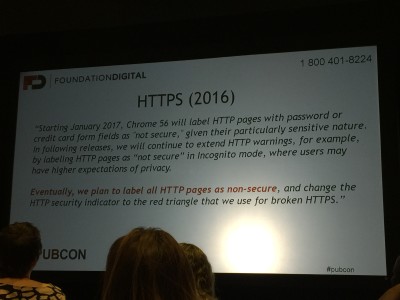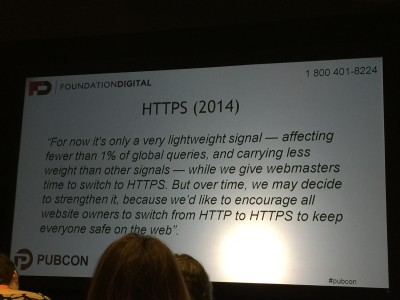Ahh, I have fond (was it really fond?) memories of Greg Boser helping me back in another life with real estate marketing. Real estate SEO was SUPER fun. It was though, and I had a really good interview back in… 2006? 2007? with Greg and one of the things I remember from that interview was really making your meta titles sound readable when they show up in the SERPS. Don’t just do keywords with dashes on what your page is about. Makes it easier for people to click on them. Or something like that. Great advice now and then. I wish I could find it but when our domain was sold, and taken over, all those tips disappeared! Bummer. Probably for the best.
Seriously, Greg always has amazing advice so I thought I would check out this session. The door is closing so we are ready to go. Greg is really waiting for those doors to close so everyone is sitting.
He’s doing good, we are doing good. We have an hour so hopefully we will have a good Q & A too. Good amount of first-timers in the room by a show of hands.
This is Greg’s 20th year of working on the interwebs and has primarily been in organic search. He was spamming search engines before Google existed.
He brings up a slide that Twitter style “Journalism” is making us SEO stupid. He brings up Gary Illyes “30x redirects don’t lose PageRank anymore”. Every publication picks up the tweet and we have 1,710 articles at the end of the day.
The “articles” had no depth or context to it. It’s a “hey guess what” article with too many implications. Since redirects “don’t loose page rank” ESPN flipped from espn.go.com to ESPN.com and the article was absurd in its theories. He was involved personally in the project for 2 1/2 years and put up a slide of a million decisions before they could migrate off Go.com. At any time did they discuss it because the 301’s would cause it to loose page rank. It was just absurd. Migrations are extremely hard and PR is not the one thing that you worry about when doing something like that.
So how accurate is the original statement? It lacks context.
Those of us that spend time testing and jumping into this stuff “depends”. It doesn’t work the same way every time. A funny thing is a week later the news came out that 301’s redirecting to the homepage don’t work as best as doing a one-to-one redirect.
The ultimate value of any redirect is strongly connected to the context in which it is used.
The way Google works now, they are very authoritative. So these huge sites are repeating those tweets and makes it difficult for new people who really don’t know better. Where are the sites that you want to research and delve into those things? These random tweets are coming into management meetings where it has no basis to be.
Everything You need to Know About Redirects:
http://www.slideshare.net/cemper
Kristoph is crazy. Greg put up a slide that he put on. Check out the slide share link. GO look to see his graphs. They are from differently applications on redirects. Each graph is very different. The point is the time and effort to do that research is still totally in line with what Greg sees to be true. Google’s algo now is where it is ten years ago with what they can or can not do.
There is always more to the story, basically, is Greg’s point.
He moves on to the most over-hyped and talked about topic is Google’s RankBrain. The AI component is cool but Greg says, “Forget about it!” It’s a non-factor.
If you do want to dive into it? Go to StoneTemple. They have really dived into it.
Sample of Improved Queries:
- What is the title of a consumer at the highest level of a food chain?
- Can you get 100% score on Super Mario without a walkthrough?
- Who is low in the Army?
- Why are pdfs so weak?
A better example.. he puts up a phrase with bolded phrases on the SERPs, and in listings there are terms missing from the page but the page is showing up. The phrase is “who invested the phrase link juice”.
How do you optimize for RankBrain?
“What is the title of a consumer at the highest level of a food chain? ”
The top and the bottom listing basically scrapped wikipedia, did exact match title for the phrase, and he’s #1. Use old fashion common sense SEO. Or, upload a lame music video with an exact-match title to an authoritative site (Vimeo, I think?) and do an exact match title on it and rank on the first page.
What about Bing? Says no one ever…
But SEO wins in Bing too.
When should you care about it? He shows when Apex predator comes up for the phrase. That is the answer to that question… Greg made a fake result but when you start seeing the direct answers of yes or no questions… it will be improving.
If you are doing old style Q&A content, this stuff will help you.
Featured Snippets (aka Position Zero)
Greg loves that phrase, super clever. Drive those eyeballs and get your company front and center. The landscape of the search result is changing. Type in: espy winners – and all the winners from 2016 are at the top, the right side is taken up. It’s all from ESPN but the organic listing for ESPN is #2 and they are taking the content to just keep you on Google and answer your question. Predatory aggregation with as little credit as possible. They are moving more in that direction. It affects brand queries too.
They take the listing that is already ranking, they highlight it and put it in a big box. Greg feels sometimes it’s detrimental since the person gets the answer and they don’t click through.
He brings up “college basketball rankings”, I think but talks about how you don’t need to be #1 to show up. He comments that SBNation is great at doing this type of content. Good Q & A and their style of writing really works. They trumped wikipedia to get that position zero. He shows a #5 organic ranking page but they pulled it and showed it on top.
From that standpoint, is it worth chasing? It can be, Greg says. It’s straight HTML extraction. There are plenty of posts where you can read how to do it. It’s just a formatting issue. Greg likes SEMRush to pull for keywords and listings to see how they come up. Look for featured snippets.
If you take the time to format it better than your competitors. So take that time, look at the content, and read up on what drives it and make those tweaks.
The key thing is that they are very fluid. He’s studied ESPN’s listings and they change quite a bit. He’ll pull results from 5 days ago and it’s already changed. Take it with a grain of salt. But you can easily test that. It could be a big win. It’s easy to test on a small thing and get data on it.
Penguin
Greg tried to get people to admit if they were hit… or if they recovered. I don’t think I saw any hands up! We know it’s real time now. You don’t get caught in one filter pass, so that’s great.
In theory, it’s less punitive. It’s page-centric vs site-centric. It’s also going to demote instead of devalue. The good stuff can still rank.
Panda and Penguin changed where they would just ban the whole site. Its’ a dangerous and tough environment to be in because it makes it hard to test. From what we can tell,
If someone did something stupid, they might just ignore it and not show it. Greg was reading yesterday or listening to Danny’s podcast, they brought up profile links. It survived a lot of crap. You get a user account on a high profile domain, you get a user name with a link to your content. Google’s weight with the authority of the domain, causes the sites to do really well. A few hundred links will make you dominate. They are saying it won’t work very well… but Greg doesn’t think so right now. Maybe they haven’t crawled it yet, or processed it as fast but you should look out for that. With this automated landscape, there will be aggressive testing on this stuff. Don’t get super excited and believe you can do it but there will be multiple iterations and you can bet on the fact that the sophisticated part of the algo is not quite there.
YOU believe it, so it must be true. Fake it til you make it. Google has done that for years.
It’s cut out more of the human review for mistakes that happen which is good for both Google and for you.
Management can get stuck in these situations where you have a new guy, or a hot head, and they get caught up in stuff. So these filters that only run once a year but now it’s baked in and it won’t be as detrimental.
It’s time to disavow the disavow file!
Rand Fishkin from Moz did a whiteboard Friday about this. If you are doing AI type of stuff that Google is trying to do, it’s all about data collection. So sending in that file is helping Google adjust their algorithm. Greg would say to you, using a disavow file in this environment is not something he would do.
If you create a pattern that you might still be cheating, if there is a history, that might be sent to the manual team anyway. So you can get in trouble. Just let it ride and see how it floats out. If it’s working properly and it’s not you doing it, it should take care of itself.
HTTPS
Greg took a little poll about who did HTTPS and who is going to do it.
Greg calls this positive reinforcement. If you get good grades, I’ll take you to Disneyland. It just didn’t happen though. That was two years ago.

In the near future, they will be flagging anything that is not secure. If you are taking data, you should be HTTPS. If you are just writing blog posts, eh. Not so much. But it’s time and it should be on your list to do. You don’t want that red alert. Obviously if you are selling stuff.
Does Greg think it’s overkill? Yeah, he does. But it’s time to focus on it.
What You Need To Know
It’s not a quick and easy thing. Just go get a certificate. Not. If it’s just a WordPress blog, it might be. Anything else, you need a completely commitment from your dev team.
(We just switched over last year but we also had a new site. The whole thing was a nightmare. The dev team forgot to put the certificate live for 3 weeks when the whole site transitioned and I didn’t catch it. Ugh)
ESPN will be doing it by the end of 2017. Allocate the time.
Aleyda Solis has a migration checklist. It’s a Google Doc and you can use it as a checklist. Look it up!
Read “How Wired Completely Encrypted Itself” – It’s a long read but worth it. (I will be reading it later! Love Wired.)
Greg put up a post and I have NO idea what it is… Blue circle with a lighting bolt. What is it? Duh…
Google has been extremely aggressive with the big brands.
OH, it’s AMP. Duh. Yes, I’m staying away from that right now.
Big list of publishers that have gotten on board, Greg says. Google is putting out thin case studies on his site. Great studies but they don’t really say what it was based on.
AMP is now in organic results. They want to go beyond traditional publishers. eBay is involved with an AMP version of their listings. It can do a lot more than you think. (I’m still a little iffy on it.) You can look at AMP By Example. Is that a site, or what Greg put up? I have no idea. But 3rd party vendors are popping up. ScaledOn (no connection with Greg) – are you prepared? The ads are hilarious, he thinks.
Greg thinks you should get on it for a big publisher. All the little people? Maybe. The plug and play options are very weak and don’t work as well. He hates waiting on his phone so he thinks it’s cool but you might shoot yourself in the foot.
Quick Wins?
AMP for Landing Pages – Nice little graph about loading times and mobile versions of pages. But those thinks might affect quality score for AdWords. If your ad is going to an AMP page, your quality score might be better. If the numbers that are touted for mobile abandonment due to speed are TRUE, if they are bouncing, doing landing pages in AMP in theory your quality score would improve and you would pay less… so that win is going to come from PPC so you spend less. Ad performance is important. That wins with Google too.
Build and test independently of Google.
Final Thoughts from Greg Boser
He really misses Matt Cutts. He’s not here, so Greg can say that… Things worked a lot differently when he was around. The dedication to providing depth and context to what is released. He used to put out an in-depth video, so it was easier to figure out what was going on rather than a few words in a tweet. It won’t go back to that since it’s not scalable and they can control the narrative.
Dig past the tweet. Do your own testing. Find people at the shows and ask them questions. Greg says they like the dark part of the bar!
Webmaster World used to be great but now Greg hangs out in private Facebook groups where he trusts people.
You will be light years ahead of your competition.
Q – A question not heard about sub domains.
A – Greg says to ask him later.
Lunch time!



Comments on this entry are closed.